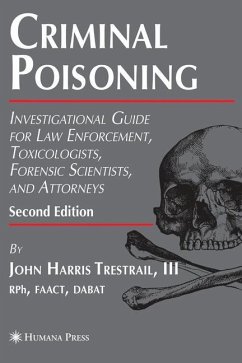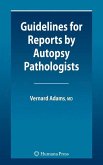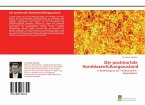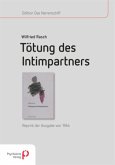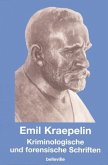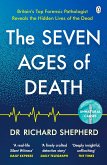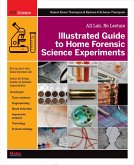In this revised and expanded edition of his critically acclaimed Criminal Poisoning: Investigational Guide for Law Enforcement, Toxicologists, Forensic Scientists, and Attorneys, leading forensic scientist John Trestrail offers a pioneering survey of all that is known about the use of poison as a weapon in murder. Topics range from the use of poisons in history and literature to convicting the poisoner in court, and include a review of the different types of poisons, techniques for crime scene investigation, and the critical essentials of the forensic autopsy. The author updates what is currently known about poisoners in general (psychological profile, types, and statistical analyses) and their victims (who gets poisoned, investigative considerations, and classic symptoms of poisoning). The Appendix has been updated to include the more commonly used poisons, as well as the use of antifreeze as a poison, to reflect some cases that have recently come to light.
Hinweis: Dieser Artikel kann nur an eine deutsche Lieferadresse ausgeliefert werden.
Hinweis: Dieser Artikel kann nur an eine deutsche Lieferadresse ausgeliefert werden.
"Criminal Poisoning represents a pioneering work dealing exclusively with toxicants in the hands of those with criminal intent. This is the first book having in-depth discussions of all aspects of murder by poisoning. . .The book is easy reading, succinct and the use of jargon is minimized. . . Dr. Trestrail emphasizes several keys points in his book. Poisons are a stealth weapon, meaning the victim and the crime scene often lacks overt evidence of violence. Maintaining the chain of custody for evidence is another point expounded. The author also argues that many poisoners do not get caught and urges that any sudden death case to be considered a poisoning until proven otherwise. . .Criminal Poisoning is an excellent resource for forensic toxicologists, coroners, medical examiners/forensic pathologists, special agents and consumer safety officers of the Food and Drug Administration, homicide detectives, private investigators, criminalists, and attorneys. Criminal Poisoning is essential reading for pharmacists engaging in work relating to forensic toxicology or death investigations. . .John Trestrail, III provides another great example of how pharmacists are involved in forensics and law enforcement."-Journal of Pharmacy Practice
"...Trestrail has put together some- 160 pages of easily read and pleasantly understandable data on the use of poisons as murder weapons...introduces beginning toxicologists to the exciting field of forensic toxicology with insights into the workings of the investigational process...this new publication is an interesting comprehensive overview of criminal poisonings for scientists, law enforcement officers, attorneys, and very likely the vast majority of the reading public."-Veterinary and Human Toxicology
"...an interesting, browsable, text on the overall criminology of poisoning." - Journal of Forensic Sciences
"The book deals with the personality of poisoners and their victims, the crime scene investigation, the forensic autopsy and the difficult problem of proving poisoning. It is well indexed and tabulated with good suggestions for further reading although no internet addresses are given which apparently contain a mine of information on how to poison people."--British Toxicology Society Newsletter
"While this is intended to be a manual for those people prosecuting or investigating cases of suspicious death by poisoning, it could also be seen as a manual for those wishing to dispose of unwanted relatives or acquaintances. This is part of the Forensic Science and Medicine Series. ... The book has a number of well reproduced diagrams showing relationships and flow-charts. ... This is an excellent and readable text - useful for both investigators and perpetrators ... ." (Adam Woolley, BTS Newsletter, Winter 2007)
"...Trestrail has put together some- 160 pages of easily read and pleasantly understandable data on the use of poisons as murder weapons...introduces beginning toxicologists to the exciting field of forensic toxicology with insights into the workings of the investigational process...this new publication is an interesting comprehensive overview of criminal poisonings for scientists, law enforcement officers, attorneys, and very likely the vast majority of the reading public."-Veterinary and Human Toxicology
"...an interesting, browsable, text on the overall criminology of poisoning." - Journal of Forensic Sciences
"The book deals with the personality of poisoners and their victims, the crime scene investigation, the forensic autopsy and the difficult problem of proving poisoning. It is well indexed and tabulated with good suggestions for further reading although no internet addresses are given which apparently contain a mine of information on how to poison people."--British Toxicology Society Newsletter
"While this is intended to be a manual for those people prosecuting or investigating cases of suspicious death by poisoning, it could also be seen as a manual for those wishing to dispose of unwanted relatives or acquaintances. This is part of the Forensic Science and Medicine Series. ... The book has a number of well reproduced diagrams showing relationships and flow-charts. ... This is an excellent and readable text - useful for both investigators and perpetrators ... ." (Adam Woolley, BTS Newsletter, Winter 2007)
From the reviews of the second edition:
"Criminal Poisoning represents a pioneering work dealing exclusively with toxicants in the hands of those with criminal intent. This is the first book having in-depth discussions of all aspects of murder by poisoning. . .The book is easy reading, succinct and the use of jargon is minimized. . . Dr. Trestrail emphasizes several keys points in his book. Poisons are a stealth weapon, meaning the victim and the crime scene often lacks overt evidence of violence. Maintaining the chain of custody for evidence is another point expounded. The author also argues that many poisoners do not get caught and urges that any sudden death case to be considered a poisoning until proven otherwise. . .Criminal Poisoning is an excellent resource for forensic toxicologists, coroners, medical examiners/forensic pathologists, special agents and consumer safety officers of the Food and Drug Administration, homicide detectives, private investigators, criminalists, and attorneys. Criminal Poisoning is essential reading for pharmacists engaging in work relating to forensic toxicology or death investigations. . .John Trestrail, III provides another great example of how pharmacists are involved in forensics and law enforcement."-Journal of Pharmacy Practice
"...Trestrail has put together some- 160 pages of easily read and pleasantly understandable data on the use of poisons as murder weapons...introduces beginning toxicologists to the exciting field of forensic toxicology with insights into the workings of the investigational process...this new publication is an interesting comprehensive overview of criminal poisonings for scientists, law enforcement officers, attorneys, and very likely the vast majority of the reading public."-Veterinary and Human Toxicology
"...an interesting, browsable, text on the overall criminology of poisoning." - Journal of Forensic Sciences
"The book deals with the personality of poisoners and their victims, the crime scene investigation, the forensic autopsy and the difficult problem of proving poisoning. It is well indexed and tabulated with good suggestions for further reading although no internet addresses are given which apparently contain a mine of information on how to poison people."--British Toxicology Society Newsletter
"The book is a fascinating read especially if you are, as I am, interested in the history, fiction, and trivia of poisoning. ... this is an extremely accessible book for all individuals, lay as well as professionals, and is written in such a way that it could be easily digested by anyone capable of reading a daily newspaper." (Daryl J. Mayers, Canadian Society of Forensic Science Journal, December, 2007)
"Criminal Poisoning represents a pioneering work dealing exclusively with toxicants in the hands of those with criminal intent. This is the first book having in-depth discussions of all aspects of murder by poisoning. . .The book is easy reading, succinct and the use of jargon is minimized. . . Dr. Trestrail emphasizes several keys points in his book. Poisons are a stealth weapon, meaning the victim and the crime scene often lacks overt evidence of violence. Maintaining the chain of custody for evidence is another point expounded. The author also argues that many poisoners do not get caught and urges that any sudden death case to be considered a poisoning until proven otherwise. . .Criminal Poisoning is an excellent resource for forensic toxicologists, coroners, medical examiners/forensic pathologists, special agents and consumer safety officers of the Food and Drug Administration, homicide detectives, private investigators, criminalists, and attorneys. Criminal Poisoning is essential reading for pharmacists engaging in work relating to forensic toxicology or death investigations. . .John Trestrail, III provides another great example of how pharmacists are involved in forensics and law enforcement."-Journal of Pharmacy Practice
"...Trestrail has put together some- 160 pages of easily read and pleasantly understandable data on the use of poisons as murder weapons...introduces beginning toxicologists to the exciting field of forensic toxicology with insights into the workings of the investigational process...this new publication is an interesting comprehensive overview of criminal poisonings for scientists, law enforcement officers, attorneys, and very likely the vast majority of the reading public."-Veterinary and Human Toxicology
"...an interesting, browsable, text on the overall criminology of poisoning." - Journal of Forensic Sciences
"The book deals with the personality of poisoners and their victims, the crime scene investigation, the forensic autopsy and the difficult problem of proving poisoning. It is well indexed and tabulated with good suggestions for further reading although no internet addresses are given which apparently contain a mine of information on how to poison people."--British Toxicology Society Newsletter
"The book is a fascinating read especially if you are, as I am, interested in the history, fiction, and trivia of poisoning. ... this is an extremely accessible book for all individuals, lay as well as professionals, and is written in such a way that it could be easily digested by anyone capable of reading a daily newspaper." (Daryl J. Mayers, Canadian Society of Forensic Science Journal, December, 2007)

